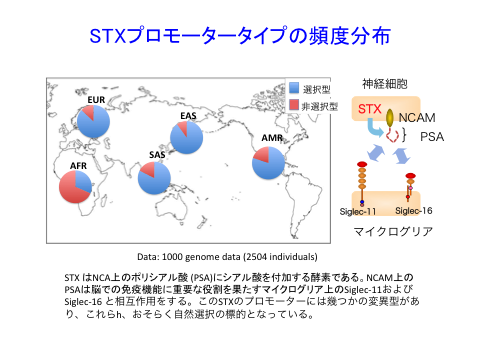Professor Yoko Satta
Human evolutionary genomics of physiological traits

Yoko Satta
Professor
| Research Area | Human evolutionary genomics of physiological traits |
|---|---|
| Google Scholar | |
| ResearchMap | |
| Interview |

Evolution of genes responsible for physiological traits reflects the history of adaptation of living organisms to ever changing environments. Our research group of human evolutionary genomics studies genetic changes that are associated with sensory systems, innate and acquired immunity, brain function, pigmentation, and diet/domestication of plants and animals by quantitatively comparing genomes and/or transcriptomes of humans with those of closely related relatives including archaic hominins.
Selected Publications, Books etc.
- 1.Lau Q., Y. Yasukochi, Y. Satta*. (2015) A limit to the divergent allele advantage model supported by variable pathogen recognition across HLA-DRB1 allele lineages. Tissue Antigens 86: 343-352. doi:10.1111/tan.12667
- 2.Suzuki-Hashido N., T. Hayakawa, A. Matsui, Y. Go, Y. Ishimaru, T. Misaka, K. Abe, H. Hirai, Y. Satta*, and H. Imai*. (2015) Rapid expansion of phenylthiocarbamide non-tasters among Japanese macaques. PLoS ONE 10, e0132016. doi:10.1371/journal.pone.0132016
- 3.Takahashi-Kariyazono S., Y. Satta, Y. Terai*. (2015) Genetic diversity of fluorescent protein genes generated by gene duplication and alternative splicing in reef-building corals. Zoological Letters 1:23 doi:10.1186/s40851-015-0020-5
- 4.Yasukochi Y. and Y. Satta*. (2015) Molecular evolution of the CYP2D subfamily in primates: purifying selection on substrate recognition sites without the frequent or long-tract gene conversion. Genome Biology and Evolution doi:10.1093/gbe/evv056
- 5.Kawashima A. and Y. Satta*. (2014) Substrate-dependent evolution of cytochrome P450: rapid turnover of the detoxification-type and conservation of the biosynthesis-type. PLoS ONE doi:10.1371/journal.pone.0100059

